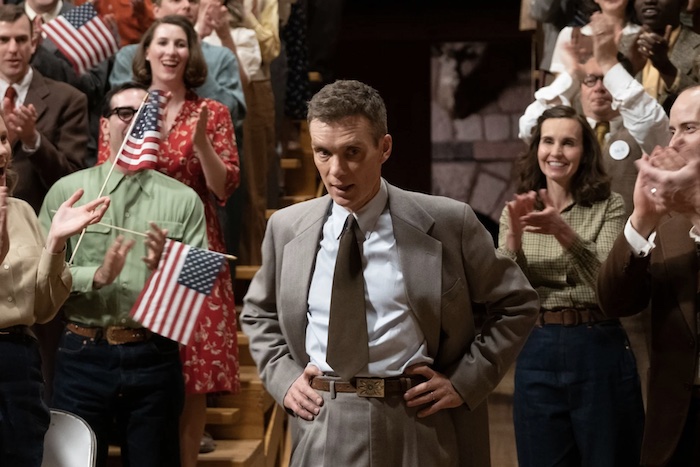

Review: Stunning, Sterile ‘Oppenheimer’ is Christopher Nolan at His Best and Worst
By Melanie Fischer | Film | July 24, 2023 |
By Melanie Fischer | Film | July 24, 2023 |

There is one image that Oppenheimer, the new biopic about theoretical physicist and “father of the atomic bomb” J. Robert Oppenheimer (Cillian Murphy) returns to more than any other. It is not a mushroom cloud or a missile or the night sky full of stars—the initial scientific fascination which lead Oppenheimer towards a destiny one imagines he hardly could have anticipated in those early days. No, it’s an image of raindrops on water, concentric rings rippling outwards from points of impact. A detail of the every day, small and quiet and even tranquil. An image that gradually warps into something infinitely more sinister over the course of three hours as it takes on new connotations—concentric rings marking blast radii, shockwaves, the reach of radioactivity.
In today’s ever more anxious and risk-averse Hollywood landscape, Christopher Nolan is one of an incredibly select group of filmmakers who can, in effect, make what he wants, precisely how he wants to, on the largest possible scale. Never before in his career has he flexed his powers quite so evidently as with Oppenheimer, in one sense his most restrained film since 2002’s Insomnia, in another his most daring film yet, paradoxically for the very same reason.
Nolan is a master popcorn filmmaker; a wizard of spectacle who makes big, loud films best viewed on the largest screen possible. A biopic is, traditionally, the antithesis of that—a star-studded but inevitably dusty, dull showcase of technical craftsmanship that one views primarily out of a sense of obligation in anticipation of awards season. And Oppenheimer is quite a talky film, particularly for Nolan. Of course, there is a very big bang central to the film, but the vast majority of the run time is spent in conference rooms and front parlors, in arguments over equations and logistics and security clearances, the scientific need for collaboration and transparency butting heads with the military-industrial complex’s demands for compartmentalization and secrecy.
Nolan’s well-evidenced love of non-linear storytelling comes in very handy here. His second collaboration with editor Jennifer Lame returns to the kind of complex yet clear temporal maze that make most of Nolan’s filmography such engagingly frenetic viewing save for the scrambled misstep that was Tenet. While the bulk of the action centers the three years in which Oppenheimer played a key role in the Manhattan Project as the first director of the Los Alamos National Laboratory, overseeing the development of the atomic bomb, the film spans everything from Oppenheimer’s university days all the way to the later years of his career, jumping forwards and backwards in time throughout. The third act in particular actively tries to deconstruct the usual trappings of a “great man” biopic, focusing on efforts in the post-war years to discredit Oppenheimer after he became an outspoken critic of the US government’s continued expansion of the nuclear weapons program.
To say Nolan is revolutionizing the biopic here would be vastly overstating things. He’s doing it bigger than anyone has before, certainly, but not quite better. If any filmmaker working today deserves that title it would be Pablo Larraín, the master of exploring the personal as political, who in recent years has made no less than three remarkably innovative biopics exploring the politically charged lives and legacies of 20th century icons with Neruda, Jackie, and Spencer. Nonetheless, Oppenheimer is a bold swing for Nolan. But as intriguing and commendable as it is to see him still pushing himself and expanding his horizons, the brilliant successes within the film are scattered with some marked stumbles.
Nolan is a masterclass director; there is no denying that he is top tier among working filmmakers when it comes to visual storytelling and a true master of spectacle. He’s not quite such an allstar when it comes to writing. As a writer, he is fundamentally competent, and even quite gifted when it comes to story structure and narrative in a big picture sense. Nolan’s kryptonite is in the details—in dialogue, and particularly dialogue related to intimacy.
He’s assembled an incredible cast who do much to cover his weaknesses on this front. Oppenheimer marks Cillian Murphy’s sixth collaboration with Nolan but his first time taking center stage. Previous projects have evidenced Murphy’s ability to do a lot with a little, particularly as an unnamed, mostly mute traumatized soldier in Dunkirk. He manages to similarly elevate the material through his performance here, and there is a lot more material to work with this time.
Murphy is a singularity of an actor whose career only ever grows more fascinating. He has remarkable range, but chameleonic is not the right term; he has never been the sort of performer to disappear into a role. With his distinctively piercing gaze and cutting jawline that fooled a generation of young British and Irish men into thinking they, too, could pull off a fade in the wake of Peaky Blinders, he might not be a household name in the US, but he’s a very recognizable face. No, Murphy does not disappear into roles; he does something more fascinating. He recreates incredibly different characters in his own image. He’s played trans women (in 2005, let’s set the discourse aside for a moment) and bumbling everymen and menacing crime bosses all while looking effectively the same. It’s the kind of performance that looks deceptively effortless, best appreciated without bells and whistles like heavy prosthetics. Never before has Murphy had such a major platform to display his abilities and he more than rises to the occasion. He pulls off a lot of heavy lifting in conveying Oppenheimer’s internal struggles through performance, particularly in places where the dialogue falls somewhat short, although there are limits.
The film attempts to explore Oppenheimer’s personal life to some degree; his womanizing and generally tumultuous love life, his politics, his Jewish identity, particularly in the context of Hitler and rampant antisemitism. But these are generally shallow and negligent explorations. While at no point in his life was Oppenheimer actively religious, the film gestures early and quite often at the notion of his Jewish identity being a significant motivator of his increasing political involvement while seeing antisemitism on the rise and engagement with the war effort. However, the film fails to ever even attempt to explore the idea of Jewishness, culturally or otherwise, besides experiencing antisemitism. However, the disappointments of the superficial explorations are perhaps still preferable to the alternative, in the places where Nolan really tries, as seen in the film’s efforts to depict Oppenheimer’s love life.
There is a surgical quality to Nolan’s films. Precise in a way that is one of his great strengths, but also sterile. A feature that, in many regards, doesn’t really present an issue until it comes to feelings—particularly intimate ones, and their inherently jagged, messy nature. It’s an Achilles heel that many commentators have picked up on in Nolan’s earlier films, but never before has he confronted the matter quite so directly. If this was a conscious attempt to silence naysayers, it could not have backfired more resoundingly. Florence Pugh bears the brunt of this failed experiment in the role of Jean Tatlock, a smart but troubled psychiatrist and Communist with whom Oppenheimer had a tumultuous romantic relationship that continued in some capacity well into his marriage to Katherine “Kitty” Puening (Emily Blunt). Pugh is a brilliant actress but there’s nothing to salvage here; most of the storyline involving her character feels like something that would have been much better left on the cutting room floor.
Of the supporting players, Robert Downey Jr. as Atomic Energy Commission member Lewis Strauss, the mastermind behind much of the post-war persecution of Oppenheimer, is a particular standout. It’s been almost a decade since audiences have seen him in a role besides Iron Man (no, I don’t want to talk about Dolittle, thanks), and the reminder of his considerable acting talents is more than welcome.
Today’s Hollywood is effectively caught in a doom spiral of diminishing returns, with studios too anxious to take big swings releasing ever more tired regurgitations of overdone IP to tepid box office results that only inspire even more risk aversion. Oppenheimer is a refreshing outlier, stunning if severely imperfect; and, ironically enough for its subject matter and bleak outlook, a glimmer of hope. A glimmer of hope that there’s still a future for big, original movies in Hollywood. Maybe even a future in which filmmakers beyond Nolan, with different perspectives and skillsets but equally bold in their visions, are able to get such opportunities. There’s room still to dream.
Oppenheimer is now playing in theaters.
← 'Radiant is the Blood' Puts the 'Venture Brothers' Sweetly to Bed | 5 Shows After Dark: 'The Golden Boy' Premiere HBO, 'Son of a Critch' Premiere The CW →
More Like This
David Dastmalchian's 'Late Night with the Devil' Takes the Late-Night Wars into the Horror Genre
Review: 'Damsel' Needs Saving from the Soulless Netflix Formula
In 'The Animal Kingdom,' Humans Turn Into What They Truly Are: Animals
'Quiet on Set' Tracks Dan Schneider's Unsettling Two-Decade Reign Over Nickelodeon
'Girls5Eva' Season 3 Is the B3st Y3t

Jordan Klepper Got A "Glimmer Of Hope" From A Trump Supporter
Leave Josh Peck Alone, Says Drake Bell in the Wake of 'Quiet on the Set' Revelations
Sophie Turner Has ‘Reactivated’ Her Divorce From Joe Jonas
Is Aaron Taylor-Johnson The Next James Bond?
Sydney Sweeney Is All Business When It Comes to ‘Madame Web’: ‘That Film Was a Building Block’
Megan Fox Helpfully Lists All The Plastic Surgery She's Had
More Like This
David Dastmalchian's 'Late Night with the Devil' Takes the Late-Night Wars into the Horror Genre
Review: 'Damsel' Needs Saving from the Soulless Netflix Formula
In 'The Animal Kingdom,' Humans Turn Into What They Truly Are: Animals
'Quiet on Set' Tracks Dan Schneider's Unsettling Two-Decade Reign Over Nickelodeon
'Girls5Eva' Season 3 Is the B3st Y3t
Reviews